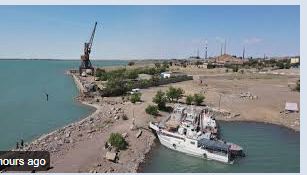Balkhash, Kazakhstan, Aug 14 (AFP/APP): Seen from the sky, with its turquoise waters stretching out into the desert expanses in the shape of a crescent, you can see why they call Lake Balkhash the “pearl of Kazakhstan”.
But pollution, climate change and its overuse are threatening the existence of one of the most unique stretches of water in the world.
One side of the Balkhash — the biggest lake in Central Asia after the Caspian Sea — has salt water, but on the other it is fresh. In such a strange environment, rare species have abounded. Until now.
“All the miseries of the Balkhash are right under my eyes,” fisherman Alexei Grebennikov told AFP from the deck of his boat on the northern shores, which sometimes has salty water, sometimes fresh.
“There are fewer and fewer fish, it’s catastrophic, the lake is silting up,” warned the 50-year-old.
A dredger to clear the little harbour lay anchored, rusting and unused, off the industrial town of Balkhack, itself seemingly stuck in a Soviet timewarp.
“We used to take tourists underwater fishing. Now the place has become a swamp,” said Grebennikov.
In town, scientist Olga Sharipova was studying the changes.
“The Balkhash is the country’s largest fishery. But the quantity of fish goes down when the water level drops, because the conditions for reproduction are disrupted,” she told AFP.
And its level is now only a metre from the critical threshold where it could tilt towards disaster.
There was an unexpected respite this spring when unprecedented floods allowed the Kazakh authorities to divert 3.3 million cubic metres of water to the Balkhash.
The Caspian also got a six-billion-cubic-metre fill-up.

















